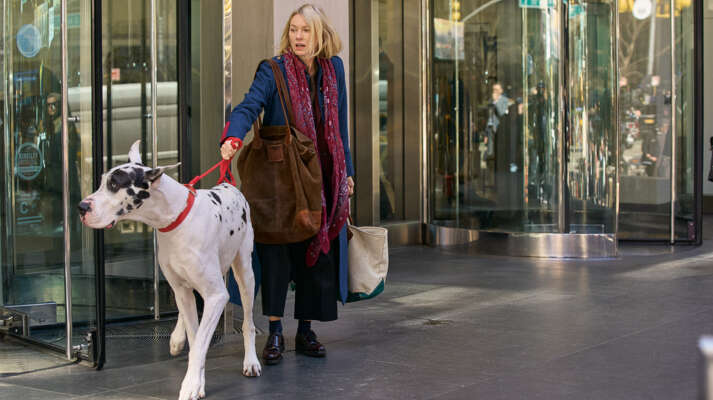Music of the Heart
Memorable classical performances in films, from On Chesil Beach to Hilary and Jackie
Music of the Heart
Written by Peter Bowen
In Dominic Cooke's On Chesil Beach, music plays an essential part in telling the audience what the characters can't say. Adapted by Ian McEwan from his celebrated novel, the film focuses on the lives of a young couple-Florence Ponting (Saoirse Ronan) and Edward Mayhew (Billy Howle)-as they move from the joys of first love to the complex reality of what being married might mean in the early 1960s. Florence, a talented violinist who dreams of one day leading a world-class string quartet, finds in music a voice for many of the emotions she can't express out loud. To construct her character, Ronan researched the famed cellist Jacqueline du Pré (whose life was explored in the film Hilary and Jackie). While Ronan learned to perform the bowing and fingering, violin virtuoso Esther Yoo did the actual playing. For Yoo, the music, especially the original scored composed by Dan Jones, provides an emotional skeleton to the drama. "The music often comes in places where characters themselves don't have the words," Yoo explains. (Find out more about this remarkable musician's role in the film in "A Q&A with Esther Yoo" [hyperlink to come]) Indeed the plaintive voice of Yoo's playing often seems to answer the very questions Florence is struggling to form about her future. The rich strain of classical music and performance in On Chesil Beach places Cooke's film in a resonant tradition of other films tuned to the music of the heart.

Hilary and Jackie | The soul of a musician
Anand Tucker 's 1998 drama Hilary and Jackie stars Rachel Griffiths and Emily Watson as real-life sisters Hilary and Jacqueline du Pré. (In On Chesil Beach, Watson plays the mother of Florence Ponting (Saoirse Ronan), another musical prodigy.) In the 1960s, both sisters dreamed of becoming professional musicians, but only Jackie seemed destined to shine on a world stage. While Hilary stayed in England, marrying and playing flute in a local orchestra, Jacqueline's cello playing made her an international star, until fate brought her brilliant career to a tragic end. While the film, especially in revealing difficult aspects of Jacqueline's private life, was not without its controversy, the performances of Watson and Griffiths were universally acclaimed, with both being nominated for a Best Actress Academy Award. In playing Jacqueline, Watson was tasked with creating both her erratic emotional journey and innate musicality. The famed cellist Mstislav Rostropovich, who'd taken Jacqueline under his wing, felt that her cello playing was so intuitive that it was if "she was born with one in her hands." To get the look and feel just right, Watson would practice up to nine hours a day on the cello herself. To get the sound perfect, the filmmakers hired Caroline Dale, a gifted young musician who'd originally been inspired by Jacqueline to take up the cello. Her goal was clear. "When people see the film they believe it's her-or at least experience the intensity of feeling she put across when she played," explains Dale. Both the actress and musician worked beautifully together to create Jacqueline in a performance The New York Times' Stephen Holden calls "one of the most insightful and wrenching portraits of the joys and tribulations of being a classical musician ever filmed."

The Beat My Heart Skipped | Soothing the savage beast
In Jacques Audiard's The Beat My Heart Skipped, a loose remake of James Toback's 1977 Fingers, Romain Duris plays Thomas Seyr, a young man caught between two destinies-his day job as a sleazy real estate broker and occasional thug and his dream of becoming a concert pianist, like his mother. Offered the chance to audition for the man who used to manage his mother, Seyr hires Miao Lin (Linh Dan Pham), a piano tutor who doesn't speak French, to guide him. To master his character, Duris turned to his sister Caroline Duris, a professional musician, to teach him Bach's Toccata in E minor, the piece he studiously practices for his audition. "I realized that being a good student with her would be a question of the family's honor," Duris joked to The New York Times. Caroline Duris also performed that Bach Toccata for the film's soundtrack. To develop the two opposing sides of his character, Duris both learned to play the piano and kept himself awake all night to simulate Seyr's coke-fueled jittery energy. For Salon's Stephanie Zacharek, both attitudes showed up in the film that "bristles with life and energy. It's a movie made with equal measures of bravado and humility-the same mix of qualities you need to play Beethoven, Mozart or Bach."

Immortal Beloved | A man's music is his life
Much like Citizen Kane, Bernard Rose's Immortal Beloved attempts to unlock the secret of a great man's life by unraveling a mystery he left behind. The man in question is Ludwig Beethoven (played by Gary Oldman) and the film's Rosebud is the composer's "Immortal Beloved," the shadowy muse to whom Beethoven refers to in a deathbed letter. While structured like a detective story, Rose actually took his inspiration from a different genre. "You have to regard this as a musical, inasmuch as the film was written to the music and a lot of the scenes directly fit with certain pieces of music," he told The San Francisco Chronicle. Oldman echoed this when he told Charlie Rose, "I am no more knowledgeable about Beethoven than you are because he is whatever you want him to be when you hear that music." Rose carefully choreographed Beethoven's work-from the enchanting childhood lesson Für Elise to the glorious "Ode to Joy" section of his final Symphony No 9-to illustrate seminal moments of his life. World-class pianists Emanuel Ax and Murray Perahia play the piano on the soundtrack. To play the musician, Oldman would rehearse up to five hours a day, partially to get the fingering right and partially to get inside the musical mind of his character. Sir George Solti, who conducted the London Symphony Orchestra for the soundtrack, personally coached Oldman on how to play parts of Beethoven's Fifth Piano Concerto. While some historians dispute the film's historical claims, few can doubt the emotional truth of its music. "Immortal Beloved has clearly been made by people who feel Beethoven directly in their hearts, and are not approaching him through a classroom or historical setting," wrote Roger Ebert.

A Late Quartet | Finding harmony
Yaron Zilberman wanted his movie A Late Quartet to explore how a family functions. "Making a film about a string quartet, which always involves very intense relationships between the musicians-it takes about ten years for a string quartet to develop a unique sound-would be a fresh way of looking at family dynamics," Zilberman told The San Diego Reader. Working with writer Seth Grossman, Zilberman constructed a screenplay whose rhythms reflected Beethoven's Op. 131, the "late quartet" that is the film's musical center. "The story developed from movement to movement, more than act one to act three," Zilberman explained to Interview Magazine. In the film, the Fugue String Quartet is just about to celebrate their 25th anniversary when they learn their cellist (Christopher Walken) has developed Parkinson's disease. The news puts the petty squabbles of the group-composed of Philip Seymour Hoffman (second violin), Catherine Keener (viola), and Mark Ivanir (first violin)-into perspective, giving them the opportunity to regain their original harmony before playing their last concert. To prepare his actors, Zilberman filmed from multiple angles the actual Brentano String Quartet-who is heard on the soundtrack-playing the titled Beethoven piece. The actors got to study not only the individual movements, but also the way the quartet operates as a single entity. Each of the actors then translated the spirit of the musicians into their performance. "It's paradise to watch this quartet of actors…make their own kind of music," exclaims Rolling Stone's Peter Travers.

The Red Violin | Music's enduring power
After making the innovative non-fiction movie Thirty Two Short Films About Glenn Gould, François Girard changed instruments with his narrative feature The Red Violin. Following the life of an instrument from its origins in 17thcentury Italy to the present where it is appropriated by an antiques appraiser (Samuel L. Jackson) in modern-day Montréal, the film spans four centuries and five different countries. In writing the score, composer John Corigliano-who won an Academy Award for Best Original Score-created a sound that unified the various historical periods. "I thought it was important that, thematically, even when the violin is playing in 17th, 18th, or 19th century, it utilize the same material," he told Film Source Monthly. While the violin is handed off in each period, only one player, Joshua Bell, is heard throughout. Sometimes his fingers can also be seen when he served as a hand double to demonstrate fingering. "I was playing different characters musically, but at the same time trying to convince the listener that the violin had its own personality," Bell told The Los Angeles Times. In the end, the movie becomes above all about the power of music, "the idea that humans in all times and places are powerfully moved, or threatened, by the possibility that with our hands and minds we can create something that is perfect," explained Roger Ebert. To prove that lasting power, Bell regularly performs the music from The Red Violin in his concerts.


